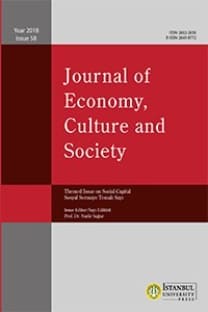TÜRKİYE’NİN ANA SİYASAL-DÜŞÜNSEL EKSENİNDE DEĞİŞME EĞİLİMLERİ (1960-1980)
Cumhuriyet dönemi modernleşme tarihimizin 1980 yılına kadar olan dönemini üç evreye ayırmak mümkündür: (1923-1938), (1938-1960) ve (1960-1980). Sosyo-kültürel yapıyı etkileyen en önemli değişmeler Atatürk’ün “Tek Adam” olarak en etkin pozisyonda olduğu 1923-1938 yılları arasında yaşanmıştır. İkinci evrenin son on yılı hariç Cumhuriyet Halk Partisi kesintisiz iktidardadır. 1946’da çok partili hayata geçilmiş, ancak çok partili siyasetin gerektirdiği yasal ve kurumsal düzenlemelerin yapılmaması sistemi tıkamıştır. Cumhuriyet dönemi modernleşme tarihimizin 1960 askerî darbesiyle başlayıp 1980 askerî darbesiyle sonlanan, sağ ve sol ayrımında şiddetin başat olduğu bu evre, köyden kente göçün ve çarpık kentleşmenin hızlandığı, geleneksel yapıların hızla dağıldığı, kültürel boşlukların oluştuğu bir dönemdir. Bu dönemde dünyada tedavülde olan ideolojiler tüm renkleriyle Türkiye’de de karşılık bulmuştur. Bu makalede 1960-1980 Türkiye’sindeki fikir akımları, tam da incelediğimiz dönemde yaşamış (1938-1983) ve ilmi birikimiyle sosyo-kültürel yapıya içerden bakma imkânına sahip olan Erol Güngör’ün mutlak modernist, kontrollü modernleşme taraftarları ve modernleşme karşıtı ayrımından hareketle değerlendirmeye tabi tutulmuştur. Tarama değerlendirme makalesi mahiyetinde olan bu çalışmada; fikir akımlarındaki farklılaşmalara rağmen ikinci dönem siyasî kültürde başat olan pozitivist paradigmanın etkisinin üçüncü dönemin sonuna kadar hâkimiyetini sürdürdüğü sonucuna varılmıştır.
Anahtar Kelimeler:
Pozitivist Paradigma, Modernite, Modernleşme, Türkiye, Fikir Akımları
CHANGE TRENDS IN TURKEY’S MAIN POLITICAL-INTELLECTUAL AXIS (1960-1980)
It is possible to discuss our history of modernization in the Republican era until 1980 in three periods: 1923-1938, 1938-1960 and 1960-1980. The most significant changes that affected the socio-cultural structure took place between 1923 and 1938, when Atatürk was the most potent figure as “The Only Man.” Except for the last decade of the second period, the Republican People’s Party was in power. In 1946, there was a transition to the multi-party political system but the system was blocked as the necessary legislative and institutional changes for such a system had not been implemented. The period in our Republican modernization which started with the military coup in 1960 and ended withthe military coup in 1980 and when there were deadly clashes between the left-wing and the right-wing was characterized by a rapid rural migration, improper urbanization, a fast disintegration of traditional structures and the emergence of a cultural lag. In this period, all the ideologies that were powerful around the world had their followers in Turkey with all possible varieties. In this article, the movements of thought between 1960 and 1980 are analyzed based on the distinction between absolute modernists, those favoring controlled modernization and those against it, which was made by Erol Güngör, who lived during the period in question (1938-1983) and had the opportunity to have an insider’s look at the socio-cultural structure with his rich academic background. In this article, which is a literature review, it is concluded that despite varieties in movements of thought, the positivist paradigm, which was the mainstream paradigm in the political culture of the second period, had a lasting effect until the end of the third period.
Keywords:
Positivist paradigm, modernity, modernization, Turkey, movements of thought,
- ISSN: 2602-2656
- Yayın Aralığı: Yılda 2 Sayı
- Başlangıç: 1960
- Yayıncı: İstanbul Üniversitesi Yayınevi
Sayıdaki Diğer Makaleler
PROTESTAN MİSYONERLER VE MİLLİ DEVLETLERİN DOĞUŞU: ROBERT KOLEJ VE BULGAR MİLLİ DEVLETİ ÖRNEĞİ
ÜNİVERSİTE ÖĞRENCİLERİNİN FACEBOOK KULLANMA ALIŞKANLIKLARI: SOSYOLOJİ BÖLÜMÜ ÖĞRENCİLERİ ÖRNEĞİ
PRENS SABAHADDİN İLE İLGİLİ DEVLET KAYITLARI ARASINDA BULUNAN RESMİ BELGELER
TÜRK YURDU DERGİSİ’NDE MEFKÛRE ÜZERİNE TARTIŞMALAR
1938-1980 DÖNEMİ TÜRKİYE’DE SOSYAL YAPI VE DİNAMİKLERİ
TÜRKİYE’DE KÖYLE İLGİLİ UYGULAMA VE ÇALIŞMALAR İLE TÜRK SOSYOLOJİSİNDEKİ YANSIMALARI
BAYKAN SEZER'İN METİNLERİNDE ÉMILE DURKHEIM ELEŞTİRİLERİ
TÜRKİYE’NİN ANA SİYASAL-DÜŞÜNSEL EKSENİNDE DEĞİŞME EĞİLİMLERİ (1960-1980)
